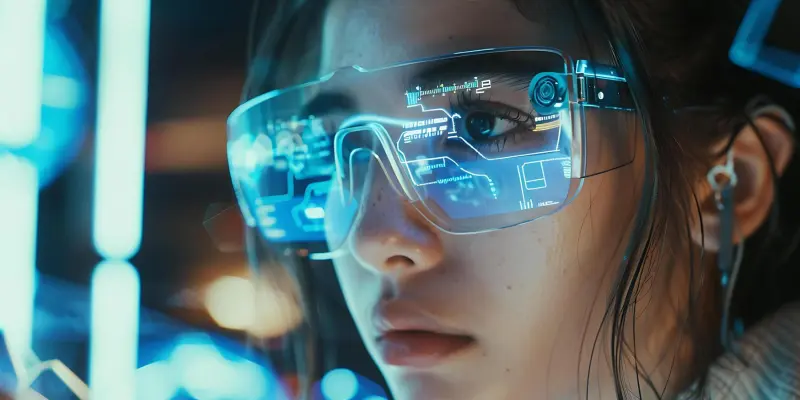The strategic collaboration between Up Network and DreamSmart aims to launch groundbreaking Web3 AI glasses by the first quarter of 2025, a monumental stride in merging artificial intelligence with decentralized technology for consumer products. These innovative glasses leverage the advanced capabilities of Google Gemini AI, positioning themselves as practical competitors to traditional Web2 products in the global market. As noted by Devansh Khatri, co-founder of Up Network, the new glasses serve as a gateway to decentralized technology, promising to enhance both user privacy and functionality significantly.
The Birth of Web3 AI Glasses
Combining AI with Blockchain
The Web3 AI glasses stand out due to their lightweight design and extended battery life, which address common issues faced by existing smart glasses. In addition to physical improvements, these glasses also offer enhanced user productivity through immersive extended reality (XR) experiences and seamless natural language interaction courtesy of Google Gemini and other AI agents. Unlike traditional smart glasses, these Web3 AI glasses are designed to protect personal data through blockchain technology, offering users unprecedented control over their privacy and data.
By integrating blockchain technology, the glasses ensure that personal information remains secure and only accessible to the user. This approach mitigates many of the privacy concerns associated with current smart technology, which often relies on centralized data storage prone to breaches. Moreover, the use of AI agents makes interaction more intuitive and efficient, allowing for a smoother user experience that aligns with the fast-paced, tech-savvy world we live in today. This blend of AI and blockchain in wearable technology is a noteworthy advancement in consumer tech, spotlighting the importance of privacy in future technological developments.
Technological Integration and Practical Benefits
Operating on Up Network’s Decentralized Mobile Infrastructure Network (DeMIN), in partnership with DreamSmart—an industry leader in AI-powered tech—the glasses incorporate the reputable StarV brand, known for its high-quality AR smart glasses. This collaboration ensures that the glasses are not only technologically advanced but also backed by reputable brands known for their expertise in AR and AI-driven innovation. Users can anticipate a seamless blend of high-end technology and practical benefits that rival other market offerings.
The announcement hints at further details being available soon, regarding pricing, market availability, and exclusive previews, stirring interest and anticipation within the tech community. The emphasis on blockchain technology for data protection, combined with the practical applications of AI, positions these glasses as a significant leap forward in wearable consumer tech. The full control over personal data granted by these glasses is expected to appeal to privacy-conscious users, making technology more accessible while addressing increasingly relevant privacy concerns in today’s digital age.
Convergence of AI, Blockchain, and Wearables
Growing Interest and Market Potential
The launch of these glasses underscores an essential trend of convergence between AI, blockchain technology, and wearable consumer devices. This trend is particularly important as it reflects a growing interest from institutional investors and retail traders in the AI sector, especially when intertwined with blockchain technology. This convergence has the potential to simplify the learning curve associated with blockchain technology and reduce the need for intermediaries, making it more accessible to the average consumer.
The combination of blockchain with AI in wearable technology also represents a shift towards more privacy-centric consumer products. This shift is driven by an increased awareness of data privacy issues and a corresponding demand for products that prioritize user control and data protection. As a result, the Web3 AI glasses by Up Network and DreamSmart are positioned as a pioneering product in this emerging market, offering enhanced security features that set them apart from traditional smart glasses, which often lack robust privacy protections.
User Adoption and Real-world Performance
The strategic partnership between Up Network and DreamSmart aims to introduce cutting-edge Web3 AI glasses by early 2025. This ambitious development represents a significant leap in integrating artificial intelligence with decentralized technologies for consumer products. These state-of-the-art glasses will harness the advanced capabilities of Google Gemini AI, putting them in direct competition with traditional Web2 products in the global market.
According to Devansh Khatri, the co-founder of Up Network, these innovative glasses are designed to act as a bridge to decentralized technology, offering substantial improvements in user privacy and functionality. The collaboration underscores their commitment to delivering a product that not only meets but exceeds modern technological demands, emphasizing security and efficiency. This initiative is expected to redefine the user experience by offering seamless integration of AI and blockchain, setting new standards for smart eyewear and wearable tech. By leveraging these advanced technologies, Up Network and DreamSmart aim to position themselves as leaders in the rapidly evolving tech landscape.

